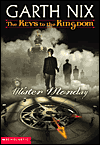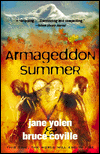YA is a mixed bag and is becoming a larger mixed bag all the time. I think we're seeing a widening gap between quality YA and no-so-good YA. It seems everyone's writing one (even me). Anyway, of the seventeen titles I read this year, these were the most enjoyable:

The Thief (1996) by Megan Whalen Turner offers a story line we've seen before: A skillful young thief named Gen is released from prison to help a king's scholar steal an ancient mythical stone. Of course it's not just any stone, but one that grants the possessor freedom from death and the perpetual right to rule. Gen is very likable and smart, but he's far from simplistic. The characters in this story are not always who they seem to be and they're always intriguing. Turner challenges younger readers with complex sentences as well as several philosophical and political issues. I have not read the sequels Queen of Attolia or The King of Attolia, but if they're anywhere near as good as The Thief, I'm there.

The Witches (1983) by Roald Dahl is actually more appropriate for younger readers (age 8 – 12), but I had a great time with it, so I'm including it here. While on vacation with his grandmother (who is an expert on witches), a young boy learns all the warning signs for identifying witches, the most dangerous beings in the world. He's forced to put his knowledge to the test when he finds himself in the middle of a witch convention at the hotel where he and his grandmother are staying. The Witches is a fun story that not only entertains, but also teaches that all sorts of people can be very skilled at disguising their real selves.

I started Scott Westerfeld's Midnighters series at the end of 2005 and read the other two books in the trilogy this year, Midnighters 2: Touching Darkness (2005) and Midnighters 3: Blue Noon (2006). The first book, Midnighters: The Secret Hour (2004) is mostly introductory, showing us newcomer Jessica as she moves to the small town of Bixby, Oklahoma, only to discover that she's one of five teenagers who can move in the secret midnight hour, when the rest of Bixby is suspended in time. Only there's plenty of nasties also creeping around during the midnight hour.
The trilogy really takes off in the second book, as the five teenagers try to discover what happened to all the other midnighters throughout history, what makes Bixby susceptible to midnighter activity, and where the next attack of creatures is coming from. And who is the strange old woman they keep seeing? The third book was not quite as satisfying as the first two, but overall a nice series.

An asthmatic seventh-grade boy, a new school, an odd-looking key and atlas, a villain in a wheelchair, dog-faced creatures, a labyrinthine house, a mysterious plague... It's all in Garth Nix's The Keys to the Kingdom, Book One: Mister Monday (2003), an exciting, fast-paced read that begins a seven-book series. (The fifth book, Lady Friday, will be released in the U.S. in March, 2007.) Nix does a wonderful job of mixing the familiar (How was the universe born and how can man control it for selfish purposes?) with fresh ideas. The biggest problem with the series? It's not finished yet.

Another storyline we've seen before is first love and The End of the World, but the Jane Yolen/Bruce Coville collaboration Armageddon Summer (1998) refuses to rehash a predictable, routine story. Fourteen-year-old Marina meets sixteen-year-old Jed on a remote mountain that serves as the last settlement of a cult called The Believers. As the end of the world approaches, what matters most? Faith, belief or love? Told in alternating chapters from the viewpoint of both lovers, Armageddon Summer is a thought-provoking YA novel filled with complex characters and no easy answers.

Treading on familiar ground once again, we have The Book Thief (2006) by Marcus Zusak, a book set in Nazi Germany, narrated by Death. You might think "I've seen this before. Do we really need another YA novel about Nazi Germany?" Okay, you've got a valid point. But consider this from an early chapter, in which Death compares watching humans to seeing colors:
"The last time I saw her was red. The sky was like soup, boiling and stirring. In some places, it was burned. There were black crumbs, and pepper, streaked across the redness."
and later:
"There was the smell of a freshly cut coffin. Black dresses. Enormous suitcases under the eyes. Liesel stood like the rest, on the grass. She read to Frau Holtzapfel that same afternoon. The Dream Carrier, her neighbor's favorite."
This is not your father's YA Nazi Germany novel.
Early in the book, Death follows a young girl named Liesel Meminger and her brother as they are being sent to live with foster parents near Munich in World War II. Death claims the boy and many others, but is intrigued by Liesel, who finds in the snow a book on gravedigging. Her new-found passion for books will have lasting (and not always pleasant) impact and consequences on everyone she encounters.
Although Death's chapter and sub-chapter headings can become tiresome, Zusak by and large avoids sticky-sweet sentimentality and emotionally manipulated scenes. I'm not quite ready, as some seem to be, to proclaim The Book Thief a "modern classic" (whatever that means), but there's no denying the book's power and Zusak's storytelling ability.
Other YA books I enjoyed:
Crispin: The Cross of Lead (2002) – Avi
Only You Can Save Mankind (1992, reissue 2004) – Terry Pratchett
Tuck Everlasting (1975) – Natalie Babbitt
The Amulet of Samarkand (2003) – Jonathan Stroud
The Spiderwick Chronicles, Book One: The Field Guide (2003) – Holly Black & Tony DiTerlizzi
1 comment:
Yeah, I think the thing that really got me about Midnighters was how unexpected the ending was. Usually that's great, but it seemed so hollow. I still don't know about it, but that could be a mark of a great book.
Thanks for this survey. Lots of good stuff to read here. (Damn it.)
Post a Comment